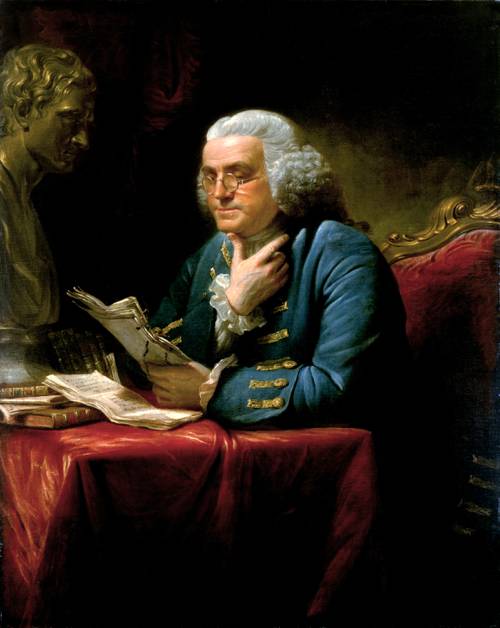
FAQ About Benjamin Franklin

Who was Benjamin Franklin and what was his role in American history?
Benjamin Franklin was one of the most prominent Founding Fathers of the United States. He was a noted polymath who made significant contributions to various fields including politics, science, and social institutions. Franklin played a crucial role during the American Enlightenment, contributing to the shaping of the philosophical foundations of the nation. He was also instrumental in drafting the Declaration of Independence and negotiating the Treaty of Paris, which ended the American Revolutionary War.

What were some of Benjamin Franklin’s most important inventions?
Benjamin Franklin was an inventive genius, and among his most significant inventions was the lightning rod, which protected buildings from lightning damage by grounding electrical currents. He also invented the bifocal glasses, which allowed for the correction of both near and far vision. Furthermore, Franklin developed the Franklin stove, which was a more efficient wood-burning stove that provided greater heat and was safer than traditional fireplaces.

How did Benjamin Franklin contribute to the field of science?
Benjamin Franklin made substantial contributions to the field of science, particularly with his studies on electricity. His famous kite experiment demonstrated that lightning is electrical and led to the invention of the lightning rod. Franklin’s work in electricity earned him international fame and influenced later inventors and scientists, including Thomas Edison. He also studied ocean currents and helped to chart the Gulf Stream, improving navigation for mariners.

What impact did Benjamin Franklin have on the formation of the United States government?
Benjamin Franklin had a significant impact on the development of the United States government. He was a member of the Constitutional Convention, where he played a vital role in influencing the formation of the government structure. He advocated for the establishment of a government that balanced powers between different branches and supported the inclusion of checks and balances to prevent tyranny. His wisdom and diplomacy were crucial in the drafting and adoption of the Constitution.

Was Benjamin Franklin involved in publishing?
Yes, Benjamin Franklin was deeply involved in publishing. He was a successful printer and publisher in Philadelphia, known for publishing the Pennsylvania Gazette and the annual Poor Richard’s Almanack. These publications were widely read and contributed to Franklin’s reputation as a wise and witty commentator on social issues. His work in publishing helped to shape public opinion and disseminate ideas during a pivotal era in American history.

What was Benjamin Franklin’s role in international diplomacy?
Benjamin Franklin played a crucial role in international diplomacy, particularly as a representative of the United States in Europe. As the first Minister to France, Franklin worked tirelessly to secure French support during the American Revolutionary War, which was pivotal for the victory against Britain. His charm, intellect, and diplomatic skills established strong Franco-American ties, which were vital for securing the Treaty of Paris in 1783, ending the war and acknowledging American independence.

Did Benjamin Franklin ever serve as President of the United States?
No, Benjamin Franklin did not serve as President of the United States. Although he was a highly influential Founding Father, he never held the office of President. Franklin’s contributions were mostly in advisory and diplomatic roles, and he served in various capacities such as the Pennsylvania Governor and the United States Ambassador to France.

What was Benjamin Franklin’s involvement in the American Enlightenment?
Benjamin Franklin was a key figure in the American Enlightenment, a period characterized by the spread of intellectual, scientific, and philosophical ideas that shaped modern America. Franklin championed reason, scientific inquiry, and the questioning of traditional authority. His writings, inventions, and participation in founding institutions like the American Philosophical Society reflect his commitment to Enlightenment ideals and his drive to improve society through knowledge and innovation.

What were some of the popular sayings authored by Benjamin Franklin?
Benjamin Franklin was well-known for his witty aphorisms and sayings, many of which were published in Poor Richard's Almanack. Some of his famous sayings include, "A penny saved is a penny earned," highlighting the importance of frugality and financial wisdom, and "Early to bed and early to rise, makes a man healthy, wealthy, and wise," emphasizing the virtues of discipline and hard work. These maxims have endured over time, illustrating his insight into human nature and social behavior.

How did Benjamin Franklin influence education in America?
Benjamin Franklin had a profound influence on the development of education in America. He founded the Academy of Philadelphia, which eventually evolved into the University of Pennsylvania, emphasizing a balanced curriculum that included both practical and classical education. Franklin believed in the accessibility of education for all, advocating for the integration of science and practical skills into educational programs. His innovative ideas on education were instrumental in shaping modern American educational structures.

What are some lesser-known facts about Benjamin Franklin?
Among the lesser-known facts about Benjamin Franklin is that he was an avid chess player and considered one of the first chess enthusiasts in America. Also, he proposed the idea of daylight saving time as a way to economize energy use. Additionally, Franklin was a skilled swimmer and was inducted into the International Swimming Hall of Fame due to his contributions to the sport.

Did Benjamin Franklin have any role in the abolitionist movement?
Benjamin Franklin was involved in the abolitionist movement later in his life. Although he had owned slaves earlier in his life, his views evolved, and he became a prominent advocate for the abolition of slavery. Franklin served as the president of the Pennsylvania Society for Promoting the Abolition of Slavery, strongly supporting the abolitionist causes and advocating for the education and integration of freed African Americans into American society.

How did Benjamin Franklin’s experiments with electricity influence modern science?
Benjamin Franklin's experiments with electricity were groundbreaking and laid the foundation for modern electrical science. His discovery that lightning is a form of electricity led to the invention of the lightning rod, which has saved countless structures from fire and damage. Franklin’s meticulous documentation of his experiments allowed future scientists to build upon his findings, eventually inspiring developments in electrical theory and practical applications, such as electrical power and communications.

What was Benjamin Franklin’s philosophy regarding self-improvement?
Benjamin Franklin was a strong proponent of self-improvement and is renowned for his lifelong pursuit of personal and moral excellence. He famously developed a system of 13 virtues, which included concepts like temperance, silence, and frugality, and he followed a daily schedule designed to foster productivity and introspection. Franklin's philosophy encouraged continual learning and ethical behavior, forming a model for self-improvement and personal development that is still referenced today.

What other roles did Benjamin Franklin hold aside from inventor and diplomat?
Aside from his roles as an inventor and diplomat, Benjamin Franklin was also an author, printer, philosopher, and scientist. He was deeply involved in civic roles and contributed extensively to community projects such as founding libraries and hospitals. Franklin also served as Postmaster General, where he improved mail service efficiency, and he was actively engaged in political matters, serving in various administrative capacities within Pennsylvania and the federal government.

What was Benjamin Franklin’s contribution to public health?
Benjamin Franklin made significant contributions to public health during his lifetime. He was instrumental in introducing smallpox inoculation into America, a groundbreaking method of immunization at the time. Franklin also advocated for sanitary practices, recognizing the importance of clean water and proper sewage disposal for preventing disease. His work in public health demonstrated his commitment to improving society's overall well-being.

How did Benjamin Franklin’s upbringing influence his career and legacy?
Benjamin Franklin’s upbringing had a profound impact on his career and legacy. Born into a large family in Boston, Franklin had limited formal education, prompting him to become self-taught through reading and experimentation. His industriousness and curiosity drove him to learn diverse skills, ranging from printing to scientific inquiry, which eventually led him to become a respected polymath known for his practical wisdom and innovative spirit.

What was Benjamin Franklin’s stance on religion?
Benjamin Franklin’s views on religion evolved over time, reflecting a pragmatic approach. Raised in a Puritan household, Franklin adopted a more secular and deistic perspective, emphasizing morality and virtue over formal religious practices. He believed in a higher power but prioritized practical ethics and enlightenment ideals over dogmatic beliefs, advocating for tolerance and rational inquiry within religious discussions.

Did Benjamin Franklin influence the establishment of libraries in America?
Yes, Benjamin Franklin significantly influenced the establishment of libraries in America. In 1731, he founded the Library Company of Philadelphia, which was the first American subscription library. This system allowed members to pool resources to buy books, creating public access to information and fostering communal learning. Franklin’s innovation laid the groundwork for the development of public libraries across the nation.
